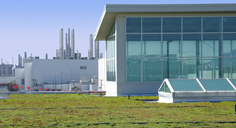Dearborn Truck Plant represents the company's vision of sustainable manufacturing, as well as being the flagship of Ford's next generation of lean and flexible plants.

Setting the Standard for Efficiency and Environmentally Friendly Processes
In the Dearborn Truck Plant, we’ve taken the principles of lean manufacturing pioneered by Henry Ford and refined them for a new century. Lean processes, such as just-in-time and vehicle-sequencing, eliminate wasted time and effort, while supporting the continuous improvement of quality.
Dearborn Truck Plant is capable of building up to nine different models for three vehicle platforms, while setting world-class standards for efficiency and environmentally friendly manufacturing processes.
A New Kind of Factory
The plant was designed from the ground up to be a new kind of factory environment. The spacious interior is bright and well ventilated. Mezzanines and overhead walkways reduce foot traffic on the plant floor. Extra-wide aisles and the absence of towering stacks of parts give employees more room to work. Work stations are designed around input from line operators.
The result is a workspace that is much more people friendly than a traditional assembly line. Individual pallets for every vehicle carry vehicles quickly and adjust to different heights, so that operators don't have to work with their hands above their heads, or stoop to do a job below their knees. Everyone uses DC electric tools, which are quieter and more precise than pneumatic tools, place less stress and strain on the operator and use less energy.
Environmental Efforts
In addition to a "living roof" of green plants and other innovations that generate economic as well as environmental benefits, Dearborn Truck Plant maximizes the use of natural light and ventilation to reduce the economic and environmental costs of heating, cooling and powering the plant. A new paint shop uses water-based primer and base-coat systems to minimize harmful volatile emissions while maintaining quality.
In addition, efforts are made to use as much returnable packaging as possible to reduce the volume of waste. The ultimate goal is a total waste management system, incorporating transportation, disposal, recycling, reclamation and reuse of plant waste.

